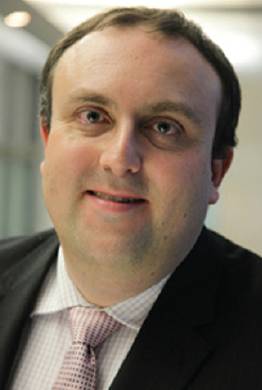Cover story
CILEx attracts a Professor, Dean and Author
The newly created CILEx Group Board has the task of maintaining the organisation’s reputation. Professor Chris Bones talks about this and many other challenges.
 About the author
About the author
Neil Rose is the editor at Legal Futures
So, you are looking to recruit the executive chairman of the new CILEx Group Board. What are some of the key attributes you are looking for? An understanding of organisational change, ideally, and a background that understands both business and education. Certainly, you want someone with leadership abilities and a demonstrable commitment to equality of opportunity. Basically, someone who gets people.
And then along comes Professor Chris Bones for the interview, and it looks like the job description and person specification were written with him in mind.
He started his career in HR, and held senior roles in Diageo and Cadbury Schweppes before swapping business for education as the first non-academic dean of Henley Business School, which was one of the few top business schools in Europe that admitted people without formal qualifications. He is now the Dean Emeritus.
In addition to his new role at CILEx, Professor Bones is also chair of Good Growth Limited, a digital services company that he co-founded, Professor of Creativity and Leadership at Manchester Business School, and a non-executive director of MK-LF Partnership, which helps companies develop their senior female talent.
His book, The cult of the leader: a manifesto for more authentic business won the Chartered Management Institute/British Library Management Book of the Year prize in 2012.
So, it is clear what appealed to CILEx about Chris Bones, but what was it about CILEx that made him apply?
‘I’ve always been hugely motivated by two things: doing the right thing by people and the principle of fairness and equality of opportunity. Those have defined most of the choices I’ve made about what I do,’ he tells the Journal.
‘I’m attracted by organisations that open up opportunity, build skills and allow people to fulfil their potential. That is precisely what CILEx does and explains why I was attracted by the role.’
He was also encouraged that, unlike ‘many’ professional organisations, ‘it was really interested to see how it could learn from people with complementary skills who came from different places’.
He adds: ‘CILEx is clearly looking to respond to the 21st century in what it’s doing: continuing development and access to all parts of the profession for its members. It is thinking about what a modern membership organisation should be doing and how it’s run.’

There is a six-month transition into the new governance structure, and of course the shortterm priority is making it work.
‘It’s a new form of governance and people are approaching it with goodwill, but it is a huge change,’ says Professor Bones.
Alongside CILEx’s belief that it can learn from those outside the profession, he says the independent members of the Board will ‘have to show humility, as it’s not our profession and there are many things we need to learn and appreciate’.
His outside perspective, though, is instructive: ‘I find it interesting that people are not necessarily regulated by activity but by tribe. I suspect the public and ultimately consumers of legal services would want something that’s a lot clearer and easier to understand than the current set-up.’
This echoes the Legal Services Board’s preferred regulatory model that moves to regulation by activity rather than professional title, although there is no prospect of that happening any time soon.
In the meantime, the Group Board’s goal is to ‘encourage, support and stretch’ the Chartered Institute’s executive leadership so that it remains alongside, if not in front, of the curve in what is an ever-faster-moving profession.
‘The Group Board owns the strategy and will ultimately determine if it is a success, but it’s going to be a collaborative process. It will be for individual company boards to deliver their parts of the strategy really well.
‘We want to establish real clarity about who’s responsible and accountable, and have transparent measures to ensure that we are on track.’
At the same time, he continues, the whole CILEx Group has a greater ‘existential challenge’ as apprenticeships, in particular, mean that there is a lot more competition in the ‘earn-as-youlearn ’ area of legal training which the Chartered Institute has championed for so many years.
Professor Bones says: ‘We have to ensure that everybody - members, employers, the public and those approaching decisions about the next stage of their careers - understands who we are, what we do and why we’re a positive choice for people looking for a career in the law.
‘That is a big task; it’s about identity. People know what a solicitor and barrister is, but what’s a Chartered Legal Executive and why would I consider becoming one?’
Yet even though the training marketplace is becoming much more crowded, Professor Bones argues that CILEx’s long history gives it a significant advantage.
‘CILEx has a much better understanding of how you engage, and educate and develop professional skills in a wide range of people without a professional background. That’s a huge shift for those getting into apprenticeships.
‘Building on those skills and differentiating further will allow CILEx to maintain its position as the premium and primary source of work development for those from non-traditional backgrounds.’
He says that CILEx needs to encourage people to ‘embrace and exploit’ the opportunities that come with Chartered Legal Executives having parity with solicitors and barristers, such as the flexibility to ‘get to where they want to go’ in the law in a more focused way than other qualifications allow.
The Group Board has an overarching duty to the public interest, and is also charged with protecting CILEx’s Royal Charter and its reputation. Everything CILEx does should always go through ‘a reputation filter’, he says.
‘We’re a public interest body, a Royal Charter body, we should expect scrutiny and we welcome it.’
And he believes that there are real opportunities to enhance the Chartered Institute’s reputation further. ‘We need to show where Chartered Legal Executives add value: we need to show the range of what they do; the quality of their work; and the contribution they make to their communities and society at large.
‘It is a slow process of change, but one thing CILEx has on its side is that people are increasingly suspicious of elites.’
Indeed, he points to his daughter, who started studying law in the UK, but recently qualified in New York and is working in public and international justice.
‘What’s inspirational is that she wants to change the world, and sees that you do it by changing the law such that the system works for all rather than a privileged minority.’
So, communication is at the heart of Professor Bones’s commitment to CILEx members. ‘One promise we can give them is to make sure their voices are heard. It is a membership organisation.’
And his message to members? ‘You represent something that is remarkable and very refreshing about the legal profession, which is that you come to it often with very different experiences.'
‘Many of you have worked to get here from diverse backgrounds, and the experience that your clients have through you is often much more valuable because of that.'
‘I have huge respect and admiration for our members: they deserve the best possible services and support and to have a body that can attract the very best into the profession, and that’s what I’m very much committed to do.’